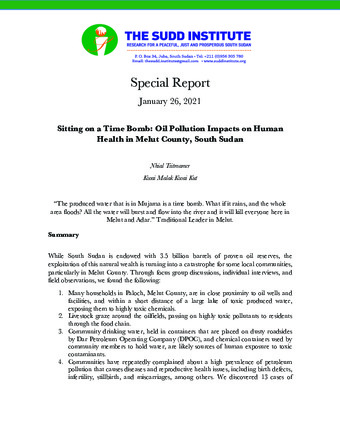Sitting on a Time Bomb: Oil Pollution Impacts on Human Health in Melut County, South Sudan
Publication Summary
While South Sudan is endowed with 3.5 billion barrels of proven oil reserves, the exploitation of this natural wealth is turning into a catastrophe for some local communities, particularly in Melut County. Through focus group discussions, individual interviews, and field observations, we found the following:
- Many households in Paloch, Melut County, are in close proximity to oil wells and facilities, and within a short distance of a large lake of toxic produced water, exposing them to highly toxic chemicals.
- Livestock graze around the oilfields, passing on highly toxic pollutants to residents through the food chain.
- Community drinking water, held in containers that are placed on dusty roadsides by Dar Petroleum Operating Company (DPOC), and chemical containers used by community members to hold water, are likely sources of human exposure to toxic pollutants.
- Communities have repeatedly complained about a high prevalence of petroleum pollution that causes diseases and reproductive health issues, including birth defects, infertility, stillbirth, and miscarriages, among others. We discovered 13 cases of birth defects, including spinal bifida, facial and head deformities, sexual organ deformities, limb deformities, and growth retardations.
- All of the participants expressed anger and frustration, a sign of a more serious potential crisis that could cripple petroleum industry operations in the area, if not prioritized and addressed.
We recommend the following to the Revitalized Transitional Government of National Unity (RTGONU) and DPOC:
- Urgently identify areas sufficiently distanced from the oil fields, build basic services infrastructure in those areas, and relocate residents away from the oil fields and facilities;
- Fence off the oilfields to prevent access by humans, livestock, and wildlife;
- Conduct a comprehensive environmental and social assessment similar to the one that was conducted in Ogoniland in Nigeria by the United Nations Environment Programme (UNEP) to assess the extent of pollution damage, determine compensation and remediation costs, and make recommendations that are enforceable through an act of parliament or a presidential order; and
- Expedite the tabling, review, and passage of the draft Environmental Protection and Management Bill to strengthen environmental protection rules and enforcement capacity to better protect the health and welfare of those South Sudanese suffering from oil industry operations.
Nhial Tiitmamer has served as the Director of the Environment and Natural Resources Program at The Sudd Institute where he is currently on leave to work with United Nations in South Sudan (UNMISS). He has served as an Adjunct Assistant Professor at the University of Juba where he has taught Environmental Economics, Natural Resources Economics and Environmental Sociology. Between November 2021 and November 2022, Nhial worked as Senior Environment Associate with the United Nations High Commissioner for Refugees (UNHCR) in Juba. Before returning from Canada in 2013, Nhial worked at Arletta Environmental Consulting in Calgary and at University of Alberta’s Augustana Campus in Camrose in Alberta, Canada. Nhial’s research focusses on natural resources governance, environmental protection, climate change, and sustainable energy. He was awarded in May 2023 by the Board of Directors of The Sudd Institute with Research Impact Award for policy impacts. Nhial holds a B.A. in Environmental Studies with a minor in English Literature from the University of Alberta and an M.Sc. in Sustainable Energy Development from the University of Calgary in Alberta, Canada.

